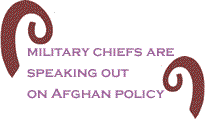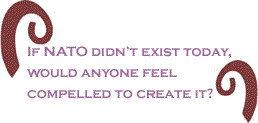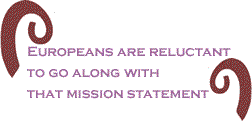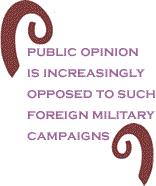When
General George Joulwan appeared on BBC America the
other day, he danced around the question of the future of
the North Atlantic Treaty Organization. But the former NATO
supreme allied commander in Europe did have a couple of
interesting things to say about the war in Libya.
 It
is true, Joulwan said, that the allied forces fighting there
to overthrow the regime of Col. Muammar Gaddafi are running
out of weapons and ammunition; in fact, they are short of
the kinds of precision weaponry that limits collateral damage
to civilian non-combatants. They just might end up having
to �buy them from the United
States,� said Joulwan, a director at
General Dynamics. (The company makes fighter-bombers and
radar disablers) When asked directly about NATO�s future
he cautioned, �it�s not Club Med� and said the problem the
alliance has is an absence of U.S.
leadership and lack of �mission clarity.� But he evaded
the question of why NATO continues to exist at all. It
is true, Joulwan said, that the allied forces fighting there
to overthrow the regime of Col. Muammar Gaddafi are running
out of weapons and ammunition; in fact, they are short of
the kinds of precision weaponry that limits collateral damage
to civilian non-combatants. They just might end up having
to �buy them from the United
States,� said Joulwan, a director at
General Dynamics. (The company makes fighter-bombers and
radar disablers) When asked directly about NATO�s future
he cautioned, �it�s not Club Med� and said the problem the
alliance has is an absence of U.S.
leadership and lack of �mission clarity.� But he evaded
the question of why NATO continues to exist at all.
These
days, politicians and establishment pundits alike are widely
commenting on the question: NATO, what is it good for?
If
you accept the notion that in the years following World
War II, Western Europe faced a threat of a Soviet invasion,
then the military alliance had a raison d��tre. Actually,
that idea was as a problematic as the �dominos� that were
supposedly going to fall in Asia. The
concern about a Soviet invasion was widely accepted and
the division on the continent between the �East� and the
�West� was real. With the fall of Soviet communism and the
end of the Cold War, political support for NATO began to
decline - as naturally it would.
The
alliance did get involved in a European military conflict,
a messy one that resulted in the dismemberment of the Republic
of Yugoslavia and leading to various
simmering ethnic conflicts that have yet to be resolved.
When the U.S. decided to invade Iraq it proved impossible to bring NATO along and
the U.S.
was forced to rely on a �coalition of the willing.� Following
911, the Western Europeans did commit forces to Afghanistan
but the NATO involvement was not whole-hearted, and is now
on the wane.
 Back
in December 2009, when President Obama announced that he
was sending 30,000 additional troops to Afghanistan
and that the U.S.
would begin winding down its military operation there sometime
this year, General Joulwan said he expected other countries
to respond to an appeal from Washington. "I truly believe, if approached
right, you're going to see several NATO nations, more than
just Great
Britain, join us. What has been missing
here is a decision. There is now a decision. And once the
president makes a decision, in my experience, the military
turns to. They will generate this force and get it there
as quickly as they can to meet the mission on the ground
and I hope our NATO allies act with equal decisiveness to
get there because it's extremely important, because this
cannot drag on forever." Back
in December 2009, when President Obama announced that he
was sending 30,000 additional troops to Afghanistan
and that the U.S.
would begin winding down its military operation there sometime
this year, General Joulwan said he expected other countries
to respond to an appeal from Washington. "I truly believe, if approached
right, you're going to see several NATO nations, more than
just Great
Britain, join us. What has been missing
here is a decision. There is now a decision. And once the
president makes a decision, in my experience, the military
turns to. They will generate this force and get it there
as quickly as they can to meet the mission on the ground
and I hope our NATO allies act with equal decisiveness to
get there because it's extremely important, because this
cannot drag on forever."
Now,
18 months later, the NATO member governments involved are,
one after the other, pulling their countries out of combat
roles in Afghanistan, and the U.S. finds itself in the position
of pleading with them not use the anticipated drawn down
of some U.S. forces as an excuse speed up their own withdrawals.
Meanwhile, here at home, military chiefs are speaking out
on Afghan policy with a candor that probably would have
earned them censure or dismissal in the time of President
Harry Truman, arguing against any substantial withdrawal
this summer as promised.
�With
the Cold War and the Soviet threat a distant memory, there
is little political willingness, on a country-by-country
basis, to provide adequate public funds to the military.
(Britain and France, which each spend more than 2 percent
of their gross domestic products on defense, are two of
the exceptions here.),� Richard N. Haass president of the
Council on Foreign Relations wrote in the Washington
Post June 17. �Even where a willingness to intervene
with military force exists, such as in Afghanistan, where upward
of 35,000 European troops are deployed, there are severe
constraints.  Some
governments, such as Germany, have historically limited their participation
in combat operations, while the cultural acceptance of casualties
is fading in many European nations.� Some
governments, such as Germany, have historically limited their participation
in combat operations, while the cultural acceptance of casualties
is fading in many European nations.�
Haass
wrote that �it would be wrong, not to mention fruitless,
to blame the Europeans and their choices alone. There are
larger historical forces contributing to the continent�s
increasing irrelevance to world affairs.�
Outgoing
Defense Secretary Robert Gates used his recent final policy
speech to blast NATO and the Europeans for not adequately
sharing responsibility for policing the world. He warned
of �the real possibility for a dim if not dismal future
for the transatlantic alliance.� Haass commented that Gates
�may not have been pessimistic enough.�
�The
U.S.-European partnership that proved so central to managing
and winning the Cold War will inevitably play a far diminished
role in the years to come,� wrote Haass. �To some extent,
we�re already there: If NATO didn�t exist today, would anyone
feel compelled to create it? The honest, if awkward, answer
is no.�
Haass�
commentary was titled, �Why Europe no longer matters.� However,
Europe does matter � a great deal. It�s just that in the absence of
a perceived common threat and with the rapidly changing
pattern of global economic and political power, the glue
that held the individual nations together in military alliance
no longer holds.

�Last
month, this column noted that NATO was created in 1949 to
protect Western Europe from the Soviet army; it could long
ago have unfurled the �Mission Accomplished� banner; it
has now become an instrument of mischief, and when the Libyan
misadventure is finished, America should debate whether
NATO also should be finished,� wrote conservative columnist
George Will in the Post June 17. He went on to speak
of NATO as �a Potemkin alliance whose primary use these
days is perverse: It provides a patina of multilateralism
to U.S.
military interventions on which Europe
is essentially a free rider.�
Will�s
comment points to the crux of the matter. While Washington now views the alliance as an instrument for action in parts
of the world away from the European continent, the Europeans
are reluctant to go along with that mission statement. A
good example is the r efusal of Germany�s
conservative government to join in the attack on Libya. Reflected here is the question of Europe�s
place in the world.
Geographically,
NATO has been defined as Western Europe, plus the UK�s
two former English-speaking colonies in North America, and
with the U.S. as the linchpin. Today,
it is an alliance of 28 nations made up primarily of white
people who are being drawn into conflicts within countries
of the �third world,� primarily in Central Asia, the Middle
East and Africa. However, in the wake
of the end of the Cold war and the rise of China, India
and the BRIC (Brazil,
Russia, India
and China)
countries, tectonic shifts are underway in international
relations. Axiomatically, the movement flows from changes
in economic relations.  Germany,
for instance, is expanding its relations with Russia,
and China is Germany's
second largest trading partner outside of the European Union,
after the United States. Germany,
for instance, is expanding its relations with Russia,
and China is Germany's
second largest trading partner outside of the European Union,
after the United States.
With
regard to the conflict in Libya,
mention is frequently made of the Europeans� �special interest�
in what happens in that country, interests that the U.S. does not share. (You thought the war is being
fought to protect Libyans from attack by the undemocratic
and brutal Gaddafi regime?) Actually, in this case, it is
the special interest of the UK
and France. They have �special
interests� in what happens in their former colonies, dependencies
and with their client governments in North
Africa. And they are hardly humanitarian.
The
Fourth International Libyan Oil and Gas exhibition was scheduled
for Tripoli this October. In announcing the event,
the organizers reported, �Libya
has the largest proven oil reserves in Africa
with 42 billion barrels of oil and over 1.3 trillion cubic
metres of gas. With only 25 percent of Libya�s
surface territory explored to date there is every chance
that actual reserves could see this figure dwarfed in coming
years.�
�As
Europe�s single largest oil supplier, the second largest
oil producer in Africa and the continent�s fourth largest
gas supplier, Libya
dominates the petroleum sector in the Southern
Mediterranean area and has ambitious plans for the future.�
London
and Paris initiated the Libyan war and
lured Washington
into the conflict with appeals to NATO �solidarity.� The
Obama Administration took the bait and when it sought to
transfer responsibility for the war onto the Europeans,
it found that in addition to the European public�s aversion
to such missions, the European governments interested in
the fighting lacked the wherewithal for a sustain engagement.
 Thus,
Gates� lament about the Europeans not doing their part. Thus,
Gates� lament about the Europeans not doing their part.
Actually,
the only surprising aspect of this situation is that all
involved so badly miscalculated the cost of the aggression.
Europe is in crisis. With Greece
nearing an economic meltdown and Spain,
Ireland,
Portugal and Italy waiting in the wings, the governments on
the continent are in no position to bear any significant
additional military expenditures and it�s unlikely the European
public would put up with it.
Likewise,
in the U.S.,
public opinion is increasingly opposed to such foreign military
campaigns, especially in a place like Libya
where there is no Al-Qaida and where we are told the U.S. has �no national interest.�
The
White House cannot argue that we are in Libya to meet any international treaty obligations.
This most likely explains President Obama�s bonehead decision
to ignore the U.S, Constitution and argue that the Administration
doesn�t need Congressional approval for engaging in war
in Libya. The U.S. is currently involved in military conflicts
in Iraq,
Afghanistan, and Libya,
and now regularly launches drone attacks on areas of Yemen
from a base in Djibouti.
The latter �secret� operation is also being conducted without
authorization from Congress, and will no doubt be defended
on the ridiculous grounds that no ground troops are involved.
Once
again last week, General Joulwan complained about the supposed
absence of �mission clarity,� this time around Libya. He made it clear he believes that if it
becomes clear that the aim of the war is to bring about
regime change and the Obama Administration just says so,
the rest of NATO will turn to. He�s whistling in the dark.
An alliance that has lost its relevancy and faces economic
calamities on both sides of the Atlantic
can�t, and won�t, turn things around. What we should hope
for is that White House leadership will be employed to unite
the governments involved in giving full support to the efforts
of the African Union to find a negotiated path out of the
deepening and costly quagmire.
BlackCommentator.com
Editorial Board member Carl Bloice is a writer in
San Francisco, a member of the
National
Coordinating Committee of the Committees of Correspondence
for Democracy and Socialism and formerly worked for a healthcare union. Click
here
to contact Mr. Bloice.

|

